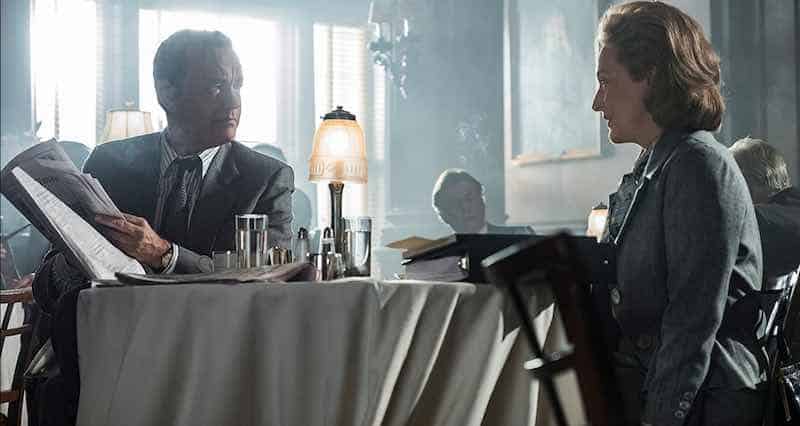The Post taps into the modern political situation like it was 1971. I don’t know how filmmakers tap into the zeitgeist of a particular moment with films like The Post that take months or years to make, but they do it again and again.
The Post is the story of the release of the Pentagon Papers. It’s told through the way Washington Post newspaper handled the question of whether to print or not to print the information. The Pentagon Papers was a decades long “study” of how the war in Vietnam came to be. It delved into why the war was continued by President after President even as tens of thousands of American soldiers died there.
The documents exposed the fact that President after President lied about Vietnam because none of them wanted to admit we were in an unwinnable war. Each President escalated the conflict through one lie and another.
Robert McNamara (Bruce Greenwood) ordered a study going back to President Truman. The study painted a damning portrait of events in Vietnam. Daniel Ellsberg (Matthew Rhys) smuggled the huge study out of the Rand Corporation in small bits, copied it, and finally delivered it to The New York Times, The Washington Post and elsewhere.
The Washington Post was a good choice for which news outlet to focus on in this story about releasing classified government documents. Kay Graham (Meryl Streep) was running the paper. It was not something she trained to do, although her father and her husband had done it before her. She was new to the role and insecure about her own leadership. The men around her all tried to influence her decisions about running the paper.

Her reporters – Tom Hanks as Ben Bradlee, Bob Odenkirk as Ben Bagdikian, Carrie Coon as Meg Greenfield and many others – all wanted to publish. They argued that it was the job of free press to keep a check on government by giving the public the truth.
Her business advisors and lawyers, played by Jesse Plemons, Tracy Letts, and Bradley Whitford, all argued for caution. They argued for not breaking federal law, for keeping the newspaper and everyone in it safe from felony charges.

The two parallel stories in The Post were Kay Graham’s journey into the courage to truly lead, while the reporters at The Post scrambled to get their hands on the study and make sense of it in order to report on it.
The government, lead by an angry and vindictive Richard Nixon, sued The Times. Because they all shared the same source, every other paper that released the story was affected by the lawsuit. Within days, the case went to the Supreme Court. The court ruled that the First Amendment did protect the right of newspapers to print the materials. The free press serves the governed, not the governors.
That phrase seems particularly relevant now, when our President and his pet news outlets try to manipulate the news in ways both subtle and blatant to make it serve their own purposes and not the needs of the people. So much of The Post is relevant to today. I was simultaneously overjoyed by the victory on the screen and dismayed by similar efforts to control the press for the benefit of those in power in 2018.
Steven Spielberg directed The Post. He captured the chaos and crisis of the time with clarity. I loved his choices about how to show the paper in action. The old fashioned typesetters using real type. The people at big tables with exacto knives and glue doing the layout for each page. The gigantic presses. The hand labor that went into bundling the papers and loading them onto trucks. The noise and vibration of the presses as they ran. The conveyor belts spiraling up and up, laden with newspapers. It took me back to the best in American journalism, the best of the American free press.
Democracy is in danger from a well-organized far right with the goal of dismantling everything that hinders free access to wealth. Films like this are important because they remind us that a free press and the truth can galvanize the people to fight once again for democratic ideals.
The Post is one of the best films of this year or any year. If you haven’t seen it yet, add it to your list of must see films. If you have seen it, please share your thoughts about it.

Why do you mention the year 1967? Two times? The secret report known as the Pentagon Papers was released in 1971. Perhaps you should revise the text.
I looked on Wikipedia and at the start of the film it said 1966. I’ll do more checking.
I understand what happened. The opening scene shows Daniel Ellsberg in Vietnam in 1966. Later around 1969 we see him back in the US where he is copying the secret report. The first installment of the report was published by the New York Times in 1971. Check the biography of Daniel Ellsberg to get the timeline right.
PS. The secret report covers the US and Vietnam during the years 1945-1968.
Thanks for a quick response. As for the movie, I agree with you: it is a great movie about an important topic.
Ah, I see I did not read carefully enough on Wikipedia. I was looking for a number and that’s the first one I saw. Thanks for the correction.
I loved the movie, and the message came through loud and clear. Two other messages stood out for me: that women were on the cusp of liberation, since it hadn’t arrived yet, and that communication has changed so dramatically. It’s a movie, as you say, everyone must see!
Sometimes it’s hard to remember how we lived just a few short years ago. People think they can’t survive without technology but we could and did for thousands of years.